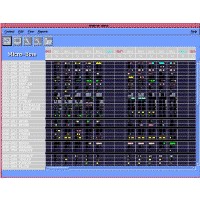Micro-opportunistic scheduling generalizes bottleneck scheduling approaches, which attempt to build high quality schedules by first optimizing the schedule of bottleneck resources. Rather than assuming the presence of one or more global, static bottlenecks spanning the entire scheduling horizon, as in traditional bottleneck scheduling approaches, micro-opportunistic scheduling continuously monitors resource contention during the construction or revision of schedules and dynamically redirects its optimization effort towards the “micro-bottleneck” (a finer type of bottleneck) that is currently the most critical. The result is a highly efficient approach to scheduling that consistently generates solutions of particularly high quality. This new approach to schedule generation and revision has been developed and refined over the years in the context of a system called Micro-Boss.
Micro-Boss has been customized for the scheduling of the Printed Wiring Assembly area at Raytheon’s Andover manufacturing facility, where it was shown to improve due date performance by more than 50 percent, reduce leadtimes by 55 to 60 percent and inventory by 20 to 30 percent depending on load conditions. The system has also been customized for a blending and packaging environment (work with Mitsubishi) and was deployed in the summer of 1997 in a large and highly dynamic Raytheon machine shop with over 150 work centers and as many staff (one of the largest such shops on the East Coast). Raytheon has indicated its intention to deploy the system at three additional sites.
past head
- Norman Sadeh-Koniecpol
past staff
- David W Hildum
- Dag Kjenstad
- Allen Tseng
